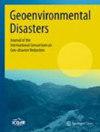开罗历史尖塔的地震脆弱性评估
IF 4
Q2 ENVIRONMENTAL SCIENCES
引用次数: 0
摘要
开罗老城的砖石尖塔极易受到地震的破坏,尤其是那些设计或更新不符合抗震要求 的尖塔。因此,有必要对其进行定期监测,以确保其安全,并发现抗震性能的任何恶化或降低。尖塔的直接损失可能导致结构本身倒塌或严重损坏。尖塔部分或全部坍塌所产生的连锁影响会对附近地区和更广泛的社区造成严重后果。通过研究地震对尖塔的影响并制定减灾战略,各国可以采取积极措施保护这些结构,确保人员安全。本研究侧重于一种特殊类型的伊斯兰建筑:开罗的历史性尖塔。研究旨在评估开罗八座文化遗产尖塔的地震脆弱性,确定影响其地震行为和地震破坏易感性的参数。研究利用经验地震脆弱性方法和对八座尖塔的环境振动测量。采用与尖塔性质和风格相适应的经验方法,利用指数值和曲线对尖塔的易损性进行评估。对该方法的有效性进行了评估,并确定了符合要求的领域和局限性。此外,还利用安装在每个尖塔内部不同高度的临时地震网络进行了环境振动测试 (AVT),以确定其动态特性。根据每个脆弱性参数的状态,计算出选定尖塔的地震脆弱性指数 (I_V)。每个参数对尖塔最终 I_V 值的贡献都已列出。为每个尖塔绘制了易损性曲线,用 EMS-98 级不同烈度地震事件的平均破坏等级来解释传统的易损性指数。这些平均破坏等级还可表明不同地震烈度级别的事件对尖塔结构和非结构元素的预期破坏程度。在选定尖塔的不同高度上进行了反向静力测试,并从记录的数据中提取了动态特性。这些特征的变化被认为对结构健康监测分析具有重要意义。由于动态特性的变化与健康监测分析相关,因此采用了峰值选取法来直接提取每个尖塔的固有频率和模态振型。最近的研究对历史悠久的开罗老城区的八个砖石尖塔进行了地震脆弱性评估。评估结果显示,脆弱性指数值从 10.3 到 26.1 不等,表明这些建筑结构易受地震事件影响。为每个尖塔绘制了易损性曲线,直观地反映了 EMS-98 地震烈度表中不同等级的潜在破坏情况。这些成果意义重大,因为它们有助于确定干预措施的优先次序,以保护最脆弱的尖塔。此外,还引入了一个新的经验周期方程,根据尖塔的高度估算开罗老城尖塔的基本周期。该方程通过实地测量和文献数据进行了验证。这项研究的局限性在于它只关注特定类别的尖塔,特别是开罗老城历史上的砖石尖塔。此外,要准确捕捉这些尖塔的动态响应,还需要详细的有限元模型,这也造成了局限性。因此,正在进行的研究包括开发详细的有限元模型和校准选定尖塔的基本周期。预期的结果有可能加深我们对历史尖塔结构动态的了解,最终指导制定有针对性的抗震改造和保护策略。这些战略旨在保护这些珍贵的文化遗产资产,代表了我们对确保这些永恒地标世世代代经久不衰的集体承诺。本文章由计算机程序翻译,如有差异,请以英文原文为准。
Seismic vulnerability assessment of historical minarets in Cairo
Masonry minarets in Old Cairo are highly susceptible to earthquake damage, particularly those not designed or updated to withstand seismic loads. Therefore, regular monitoring is necessary to ensure their safety and detect any deterioration or reduction in seismic performance. The direct loss of a minaret can lead to the collapse or severe damage to the structure itself. The cascading impacts of partial or complete minaret failure can have significant consequences for the immediate vicinity and the broader community. By studying the effects of earthquakes on minarets and developing mitigation strategies, countries can take proactive measures to protect these structures and ensure the safety of people. This study focuses on a specific type of Islamic architecture: the historic minarets in Cairo. The research aims to evaluate the seismic vulnerability of eight cultural heritage minarets in Cairo, identifying the parameters influencing their seismic behaviour and susceptibility to earthquake damage. The research utilizes empirical seismic vulnerability methods and ambient vibration measurements on eight minarets. An empirical approach compatible with the nature and style of the minarets is employed to evaluate their vulnerability using index values and curves. The method's validity is assessed, and areas of conformity and limitations are identified. Ambient vibration tests (AVTs) are also conducted using a temporary seismic network installed at various heights inside each minaret to determine their dynamic characteristics. The seismic vulnerability Index (I_V) is calculated for the selected minarets based on the state of each vulnerability parameter. The contribution of each parameter to the final I_V values of the minarets are presented. Vulnerability curves are developed for each minaret, interpreting the conventional vulnerability indexes in terms of mean damage grades for seismic events with varying intensity on the EMS-98 scale. These mean damage grades can also indicate the expected damage levels of structural and non-structural minaret elements for events with different seismic intensity levels. AVTs are conducted at various heights on the selected minarets, and the dynamic characteristics are extracted from the recorded data. Variations in these characteristics are considered significant for structural health monitoring analysis. The peak-picking method is employed to directly extract each minaret's natural frequencies and mode shapes, as changes in dynamic characteristics are relevant to health monitoring analyses. The recent study examined the seismic vulnerability assessment of eight masonry minarets in the historic Old Cairo district. The assessment revealed vulnerability index values ranging from 10.3 to 26.1, indicating a concerning susceptibility to seismic events among these structures. Vulnerability curves were constructed for each minaret, visually representing potential damage scenarios across different levels of the EMS-98 intensity scale. These outcomes are significant as they facilitate prioritizing interventions to safeguard the most vulnerable minarets. Additionally, a novel empirical period equation was introduced to estimate the fundamental period of minarets in Old Cairo based on their heights. The equation was validated against field measurements and data from the literature. The study is limited by its focus on a specific category of minarets, specifically the historical masonry minarets in Old Cairo. Furthermore, limitations arise from the need for detailed finite element models to capture these minarets' dynamic responses accurately. Therefore, ongoing research involves the development of detailed finite element models and calibrating fundamental periods for the selected minarets. The anticipated results hold the potential to enhance our understanding of the structural dynamics of historical minarets, ultimately guiding the formulation of tailored seismic retrofitting and preservation strategies. These strategies, aimed at preserving these cherished cultural heritage assets, represent our collective commitment to ensure the endurance of these timeless landmarks for future generations.
求助全文
通过发布文献求助,成功后即可免费获取论文全文。
去求助
来源期刊

Geoenvironmental Disasters
Social Sciences-Geography, Planning and Development
CiteScore
8.90
自引率
6.20%
发文量
22
期刊介绍:
Geoenvironmental Disasters is an international journal with a focus on multi-disciplinary applied and fundamental research and the effects and impacts on infrastructure, society and the environment of geoenvironmental disasters triggered by various types of geo-hazards (e.g. earthquakes, volcanic activity, landslides, tsunamis, intensive erosion and hydro-meteorological events).
The integrated study of Geoenvironmental Disasters is an emerging and composite field of research interfacing with areas traditionally within civil engineering, earth sciences, atmospheric sciences and the life sciences. It centers on the interactions within and between the Earth''s ground, air and water environments, all of which are affected by climate, geological, morphological and anthropological processes; and biological and ecological cycles. Disasters are dynamic forces which can change the Earth pervasively, rapidly, or abruptly, and which can generate lasting effects on the natural and built environments.
The journal publishes research papers, case studies and quick reports of recent geoenvironmental disasters, review papers and technical reports of various geoenvironmental disaster-related case studies. The focus on case studies and quick reports of recent geoenvironmental disasters helps to advance the practical understanding of geoenvironmental disasters and to inform future research priorities; they are a major component of the journal. The journal aims for the rapid publication of research papers at a high scientific level. The journal welcomes proposals for special issues reflecting the trends in geoenvironmental disaster reduction and monothematic issues. Researchers and practitioners are encouraged to submit original, unpublished contributions.
 求助内容:
求助内容: 应助结果提醒方式:
应助结果提醒方式:


